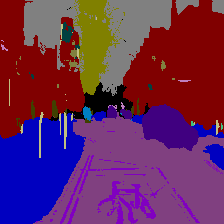Semantic segmentation with The One Hundred Layers Tiramisu: Fully Convolutional DenseNets for Semantic Segmentation
Original paper: https://arxiv.org/abs/1611.09326
Keras implementation of 100 layer Tiramisu for semantic segmentaton. Model FC-DenseNet103 from the paper above.
Tested with:
Python 3.5.2
Tensorflow 1.6.0
Keras 2.1.5
Before running a demo, download weights trained on CamVid data from the following link and place it under models\
https://drive.google.com/file/d/1T7GP7h0Q8DMLCQ3vgQdadBrFD_vZ9io3/view?usp=sharing
Test network trained with CamVid data on custom image by running:
python run_tiramisu_camvid.py
With optional arguments:
optional arguments:
-h, --help show this help message and exit
--path_to_test_file PATH_TO_TEST_FILE
Path to the image you would like to test with. Default
is: images/testImage0.png
--path_to_result PATH_TO_RESULT
Path to the folder and filename where the result of
segmentation should be saved. Default is:
images/test_image1_outcome.png
--path_to_model PATH_TO_MODEL
Path to the h5 file with the model weight that should
be used for inference. Default is:
models/my_tiramisu.h5
--path_to_labels_list PATH_TO_LABELS_LIST
Path to file defining classes used in camvid dataset.
Only used if convert_from_camvid = True. Default is
camvid-master/label_colors.txt
Run the following to train with default configuration (training on CamVid dataset) - it assumes that camvid data is in the same folder (clone it first from the repo mentioned in Notes section)
python train.py
with optional arguments:
--output_path OUTPUT_PATH
Path for saving a training model as a *.h5 file.
Default is models/new_tiramisu.h5
--path_to_raw PATH_TO_RAW
Path to raw images used for training. Default is
camvid-master/701_StillsRaw_full/
--image_size IMAGE_SIZE
Size of the input image. Default is [360, 480]
--path_to_labels PATH_TO_LABELS
Path to labeled images used for training. Default is
camvid-master/LabeledApproved_full/
--path_to_labels_list PATH_TO_LABELS_LIST
Path to file defining classes used in camvid dataset.
Only used if convert_from_camvid = True. Default is
camvid-master/label_colors.txt
--log_dir LOG_DIR Path for storing tensorboard logging. Default is
logging/
--convert_from_camvid CONVERT_FROM_CAMVID
Flag that defines if camvid data is used. If enabled
it maps camvid data labeling to integers. Default:
True
--training_percentage TRAINING_PERCENTAGE
Defines percentage of total data that will be used for
training. Default: 70 training 30 validation
--no_epochs NO_EPOCHS
Defines number of epochs used for training. Default:
250
--learning_rate LEARNING_RATE
Defines learning rate used for training. Default: 1e-3
--patience PATIENCE Defines patience for early stopping. Default: 50
--path_to_model_weights PATH_TO_MODEL_WEIGHTS
Path to saved model weights if training should be
resumed. Default: models/new_tiramisu.h5
--train_from_zero TRAIN_FROM_ZERO
Boolean, defines if training from scratch or resuming
from saved h5 file. Default: True
Tensorboard is supported to view run:
tensorboard --logdir=path/to/log-directory
- Reproduce the paper error on CamVid
- Try other datasets
Originally trained and tested with CamVid dataset available here: https://github.com/mostafaizz/camvid.git
Inspired by Jeremy's Howard fastAI course: http://www.fast.ai/
More on CamVid: http://mi.eng.cam.ac.uk/research/projects/VideoRec/CamVid/#ClassLabels

